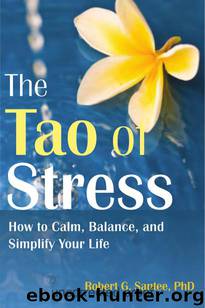The Tao of Stress: How to Calm, Balance, and Simplify Your Life by Robert G. Santee

Author:Robert G. Santee [Santee, Robert G.]
Language: eng
Format: epub
Tags: Non-Fiction
ISBN: 9781608827800
Google: nAS_NAEACAAJ
Amazon: 1608827801
Goodreads: 16158299
Publisher: New Harbinger Publications
Published: 2013-11-01T04:00:00+00:00
Reducing Your Desires
uncorrected proof
uncorrected proof
Chapter 6
Understanding Desires
From the time we get up in the morning until the time we go to bed at night, we are vulnerable to an onslaught of advertisements across all types of media telling us what we should desire and obtain in order to be happy, feel good about ourselves, and be accepted by others. In addition, friends, family members, acquaintances, colleagues, coworkers, and others also often tell us what we should desire, get, see, or watch, where and what we should eat, and so on in order for their desires— yes, their desires— to be met.
In a very real sense, and unfortunately, our self- worth often hinges on attaining what others tell us we should desire. If we don’t please them, we fear that they may not like or appreciate us. This is clearly a threat to our self- worth and leads to chronic stress.
If we haven’t attained the things that others say we should desire, we feel threatened and stressed until we obtain them. If we do attain these things, we still feel threatened because we’re afraid we’ll lose them or because we think they aren’t enough. As a result, we are still chronically stressed. This becomes an ongoing cycle in which we are never
satisfied.
We all have basic desires that are part of our evolutionary tool kit, such as for safety, security, shelter, food, a good income, companionship, sex, having children, being healthy, getting adequate movement or exercise, feeling good, being happy, being liked, and so on. All of these have an impact on how we think, feel, and behave. They are also natural.
In addition, we have desires driven by social expectations, such as for fame, status, wealth, power, longevity, or always looking good or being uncorrected proof
The Tao of Stress
youthful. These also have an impact on how we think, feel, and behave and are not inherently problematic.
However, when any of our desires, whether basic or socially driven, are continually excessive or deficient and lead to chronic stress, they become problematic. They cannot be satisfied. We don’t know when
enough is enough or how to stop indulging in or pursuing these desires.
The end result is the physical and psychological harm of chronic stress.
When traveling the Taoist path to removing chronic stress, it is
important to remember that desires, thoughts, beliefs, judgments, feelings, behavior, and environment are all intimately intertwined and interrelated. All have a bearing on your center and root and the free and natural flow of qi. When they are neither excessive nor deficient, your yin and yang are in harmony not only within yourself, but also with the environment around you.
Taoism and Desires
Across Taoist history and in numerous Taoist texts, excessive or deficient desires are viewed as a fundamental cause of fragmentation and separa-tion from Tao. Excessive or deficient desires result in disaster, misfortune, danger, vulnerability, illness, and tragedy. Excessive or deficient desires disrupt and agitate both the mind and the body. Because of our excessive or deficient desires, we are selfish, self- centered, and chronically stressed.
Download
This site does not store any files on its server. We only index and link to content provided by other sites. Please contact the content providers to delete copyright contents if any and email us, we'll remove relevant links or contents immediately.
Should I Stay or Should I Go? by Ramani Durvasula(7639)
Why We Sleep: Unlocking the Power of Sleep and Dreams by Matthew Walker(6684)
Fear by Osho(4720)
Flow by Mihaly Csikszentmihalyi(4665)
Rising Strong by Brene Brown(4431)
Why We Sleep by Matthew Walker(4420)
The Hacking of the American Mind by Robert H. Lustig(4355)
How to Change Your Mind by Michael Pollan(4338)
Too Much and Not the Mood by Durga Chew-Bose(4319)
Lost Connections by Johann Hari(4160)
He's Just Not That Into You by Greg Behrendt & Liz Tuccillo(3871)
Evolve Your Brain by Joe Dispenza(3650)
The Courage to Be Disliked by Ichiro Kishimi & Fumitake Koga(3468)
Crazy Is My Superpower by A.J. Mendez Brooks(3378)
In Cold Blood by Truman Capote(3365)
Resisting Happiness by Matthew Kelly(3331)
What If This Were Enough? by Heather Havrilesky(3297)
The Book of Human Emotions by Tiffany Watt Smith(3282)
Descartes' Error by Antonio Damasio(3261)
